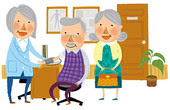Today's Health Tips

Can You Spot Heart Disease Symptoms?
Medically reviewed by Lindsey Marcellin, MD, MPH
Sometimes initial heart disease symptoms can be extremely serious, such as an actual heart attack. But if you know the more subtle signs to look for, you can take steps to help avoid a cardiac event.
You may be familiar with some of the classic signs of heart disease or a heart attack, such as chest pain, dizziness, and fatigue. But heart disease symptoms can vary between men and women — and signs of heart disease in women are often subtle, and not what you might associate with a heart problem.In fact, because certain heart disease symptoms in both sexes can be easy to overlook, the first indication that you have heart disease can be an actual heart attack, explains Alfred Bove, MD, PhD, professor emeritus at the Temple University School of Medicine and past president of the American College of Cardiology.
One of the most common and noticeable heart disease symptoms is angina, or chest pain, says Dr. Bove. But this classic symptom is more prevalent in men than women. In the case of angina, chest pain is not limited to the heart area. Both men and women may experience heart pain under the breastbone, in the neck or jaw, and in the left shoulder and arm, says Bove.
Unfortunately many people — both men and women — don't recognize these signs as heart attack symptoms. Women, especially, may not recognize that certain symptoms can indicate heart disease or a heart attack.
Heart Disease Symptoms in Women
While some heart disease symptoms (and heart attack symptoms) affect both men and women, it’s important to be aware that some symptoms are more common to heart disease in women.
"In women, angina may be felt in the back more often than in men," says Bove. Pain may also strike women differently during a heart attack, he adds, causing pain in the upper abdominal area in addition to the back. Women shouldn’t be quick to dismiss any unusual pain in the body, particularly if it's accompanied by other heart attack symptoms, such as dizziness, fatigue, or chest pain.
Before a heart attack occurs, some women may experience a number of symptoms that may not seem related to the heart. In addition to pain in the chest, arms, neck, jaw, back, or upper abdomen, other symptoms of heart attack in women include:
- Feeling particularly fatigued
- Heartburn or indigestion
- Shortness of breath
- Feeling anxious
- Breaking out in a sweat
- Dizziness
According to one study, nearly 80 percent felt at least one of these symptoms for a month or more before they had a heart attack. And only 30 percent noticed any chest pain.
Keep in mind that heart disease and heart attacks in women often don't strike until a later age, around age 55 and up — often 10 years later than in men, when women may already have other medical problems as well.
Heart Disease Symptoms in Men
The most common heart disease symptom in men is chest pain, or angina. It may feel like a tightness, pressure, or heaviness in the chest, or even a burning sensation that can seem like indigestion.
Other common heart disease symptoms in men can include:
- Irregular heartbeat or palpitations
- Discomfort fullness, pressure, or burning in the chest
- Feeling short of breath
- Feeling tired
- Swelling in the legs
- Fainting
If you experience chest pain or any of the other heart disease warning signs for longer than a few minutes, these may be heart attack symptoms and you should call 911 immediately.
What Puts You At Risk?
While heart disease symptoms differ between men and women, many of the main factors that increase risk of heart disease are the same, including:
- Being a smoker
- Having high blood pressure
- Having high cholesterol
- Having diabetes
- Having a family member who developed heart disease before the age of 60
Even simply getting older can be a heart disease risk factor, particularly in women.
Could It Be Heart Disease?
If you're asking yourself this question or if you have any of the risk factors for heart disease, call your doctor for an evaluation.
If a check-up reveals that you do indeed have heart disease or a risk factor for heart disease, such as high blood pressure or high cholesterol, start taking steps for a healthier heart and to help prevent heart disease from becoming more serious.
Last Updated: 10/24/2011
This section created and produced exclusively by the editorial
staff of EverydayHealth.com. © 2012 EverydayHealth.com; all rights
reserved.

No comments:
Post a Comment